Photo courtesy of the Recording Academy
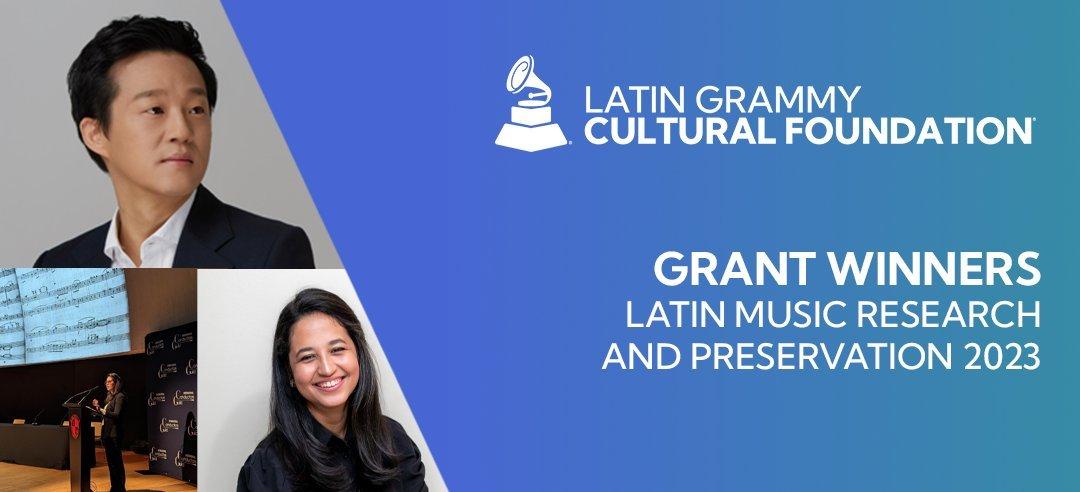
news
The Latin GRAMMY Cultural Foundation Announces Winners Of Its Research And Preservation Grant Program
This program provides grants to music institutions, nonprofit organizations, musicologists, and researchers around the world who are enhancing and preserving Latin music heritage.
The Latin Recording Academy may be most visible during the Latin GRAMMYs, but what they do during the other 364 days of the year is just as crucial — including this precious grant.
The Latin GRAMMY Cultural Foundation has announced the winners of its Research and Preservation Grant program. This program provides grants to music institutions, nonprofit organizations, musicologists, and researchers around the world who are enhancing and preserving Latin music heritage.
In 2023, an eclectic group of institutions and scholars will receive this support. The four grants, with a maximum value of $5,000 each, support diverse initiatives: The Preservation Grants fund the archiving and preservation of Latin music and its attendant customs, while the Research Grants support projects that emphasize historical and anthropological research, in addition to documenting traditions and Latin folklore.
"For the eighth consecutive year, we have the pleasure and privilege of awarding Research and Preservation Grants to deserving Latin music creators," said Raquel "Rocky" Egusquiza, the Executive Director of the Latin GRAMMY Cultural Foundation. "We are pleased to celebrate this year's honorees and their respective projects which seek to uphold the legacy of Latin music through their creative and innovative endeavors inspiring and educating future generations of creators."
Awarded Presentation Grants:
Andrew Skinner, Clayton, GA, United States, and Daniel Zanessi, Mendoza, Argentina – Through the project "Preservation and Distribution of the Studio Zanessi Collection" (Rescate y Difusión de la Colección del Estudio Zanessi), the goal is to digitalize, promote, and distribute unpublished recordings of invaluable cultural and historical significance to Argentina's interior, archived in quarter-inch tape in Mendoza's historic music studio, Zanessi Studios. This collection has been declared of national interest by the Province of Mendoza, and as its tape nears 50 years old, it is in urgent need of being preserved. The musicians who recorded at Zanessi, from around western Argentina, were foundational in shaping the sound of contemporary Argentine folk music.
Many of these musicians formed part of the Nuevo Cancionero Movement, a social artistic movement founded in Mendoza in 1963 that sought to represent the lives and experiences of everyday Argentinians, promote Pan-Americanism, and bend traditional folk music rules. The movement, with the voice of Mercedes Sosa, the poetry of Armando Tejada Gómez, the melodies of Oscar Matus, and the compositions of virtuosic guitarist, Tito Francia, inspired and linked with other "New Song" movements around Latin America. The project to digitalize the Zanessi Collection is a collaboration between Andrew Skinner, a mastering engineer and Nuevo Cancionero researcher with the University of Cuyo, and Daniel Zanessi, the owner of Zanessi Studios, who helped record many of the sessions the team is now working to digitalize. They will work with the musicians or their descendants to publish the music alongside related photos and stories.
Gustavo Ahualli, Latin American Music Center, The Catholic University of America – For many years, the Latin American Music Center (LAMC) at the Catholic University of America has suffered from a lack of resources to devote the proper time and attention towards the process of cataloging and maintaining its specialized library of Latin American sheet music, books, and recordings. The LAMC has responded to this issue by developing a multi-phase project focused on the process of cataloging and digitizing the complete collection while preserving its fragile materials.
One of the primary goals of the LAMC is to continue to create opportunities for the broad dissemination of Latin American music and culture through the resources and multifaceted activities of the Center, which include numerous institutional collaborations, cultural exchanges and world-class musical performances. The complete cataloging of this unique collection is critical for the LAMC to move forward with its plan of digitizing and preserving the materials of the Center while making this important musical treasure available to the students and faculty and the worldwide community of musicians, researchers, and performing artists. In 2021, a Preservation Grant from the Latin GRAMMY Cultural Foundation supported the launch of Phase 1 of the LAMC's archival and preservation project.
Awarded Research Grants:
Gabriela Gómez Estévez, Louisiana State University – "Dicotomía: Contextualizing the Symphonic Works of Margarita Luna García" is a project that analyzes the life of Dominican composer and pedagogue Margarita Luna García, who was one of the most notable figures of avant-garde music in the Dominican Republic in the 20th century. Her works synthesize vernacular musical material and modernist techniques. The lack of availability of published materials restricts the performance of Luna's symphonic works. The study aims to produce performance and audiovisual materials to improve access to her music and promote its study and performance. This project is partially funded by the Dominican Studies Institute of the City University of New York through their Research Fellowship program in the amount of $10,000 which covers two thirds of the $15,000 total needed for the project.
Dr. Sang Woo Kang, Seoul, South Korea – Musical borrowing is a pervasive aspect of musical creation in all genres and periods. Musicologists use several terms to describe composers' uses of existing works, including borrowing, self-borrowing, transformative imitation, quotation, modeling, emulation, decomposition, influence and indebtedness. The goal of the project "Appropriation and Multiculturalism of Latin Influence in early American Music" will be to show Latin American influence on early American music through explanatory text and recordings while also highlighting the composer Louis M. Gottschalk, one of the founding fathers of classical music in the United States, including his influences and use of folk tunes, and the Latin composers who inspired him.
This project will provide a basis for discography and teaching resources for those interested in the study of diverse influences in early American music. Gottschalk was important to the development of American musical history during a time when many people were emigrating from Latin American countries. Scholars have discussed the importance of race and racialization especially in understanding popular music of the American south.
A committee of experts from Latin America, the Iberian Peninsula, and the United States selected the recipients among numerous qualified candidates. Since its inception in 2015, the program has awarded more than $175,000 in grants to support projects, one of which received a Latin GRAMMY and GRAMMY.
Keep checking RecordingAcademy.com for more information on how the Latin Recording Academy does important work to elevate all music people worldwide!
Latin GRAMMY Cultural Foundation Launches The Nicky Jam Scholarship For Music Students In Need
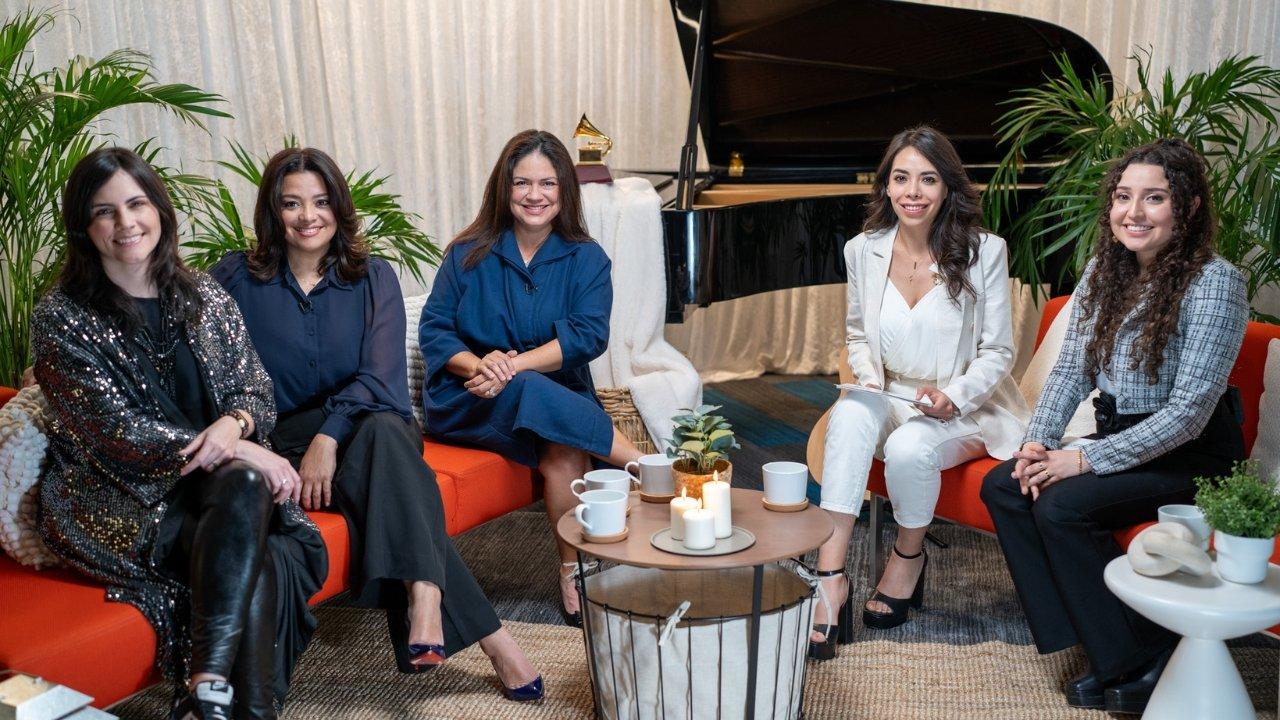
Photo: Courtesy of Latin GRAMMY Cultural Foundation Mentorship
news
The Latin GRAMMY Cultural Foundation Launches Third Annual Mentorship Program & Virtual Panel In Partnership With She Is The Music
For the third year in a row, the Latin GRAMMY Cultural Foundation in partnership with She Is The Music will host the annual Leading Ladies of Entertainment Connect TogetHER mentorship program to inspire the next generation of women leaders in music.
The Latin GRAMMY Cultural Foundation announced the third annual Leading Ladies of Entertainment Connect TogetHER mentorship program, in partnership with She Is The Music, a global nonprofit that works to increase the number of women in music.
The mentors of this year’s collaborative program include: Founder of the music and entertainment public relations firm RondenePR, Róndine Alcalá; recording and mixing engineer and Vice President of N.A.R.S Records/Dream Asylum Studios Marcella Araica; Latin GRAMMY winning sound engineer Maria Elisa Ayerbe; Latin GRAMMY winning artist Goyo; Latin GRAMMY winning and GRAMMY nominated singer/songwriter Mon Laferte; Mayna Nevarez, Founder & CEO of Nevarez Communications and Chapter Chair Women in Music Miami; award winning journalist Pamela Silva;GRAMMY-nominated engineer and vocal producer Simone Torres; Latin GRAMMY winning composer Mónica Vélez and SVP Marketing and Promotion at Sony Music Entertainment México Ana Villacorta López. Each mentor will provide one-on-one virtual mentoring sessions with young women who want to follow a career in the music and entertainment industries.
Paying-it-forward and forging opportunities for future generations is a core pillar of the Mentorship Program, and for the third year, the Leading Ladies of Entertainment Connect TogetHER Panel expanded access to these Leading Ladies expertise. Presented by Spotify for Artists, the panel was held on April 15 and moderated by mentees Stephanie Acosta and Valeria Peñaranda, who were in conversation with mentors Róndine Alcalá, Maria Elisa Ayerbe and Mayna Nevarez.
"Each year the mentorship program continues to evolve, we are grateful for the support of our mentors, the Leading Ladies of Entertainment who generously share their time and expertise to foster the next generation of women in Latin music," said Raquel "Rocky" Egusquiza, Executive Director of the Latin GRAMMY Cultural Foundation. "Together, alongside with She Is The Music, we work towards closing the gender gap within the Latin music industry."
"We are so proud and excited to continue to support and partner with Leading Ladies of Entertainment on our third year of the Connect TogetHER mentorship program," said Alexandra Lioutikoff, Co-Chair of She Is The Music Latin Committee, Group President of Universal Music Publishing for Latin America and U.S. Latin, and Board Member of the Latin Recording Academy. "Each year has given us the incredible opportunity to uplift more women in the industry and provide future generations with the tools to succeed."
The Leading Ladies of Entertainment initiative was created by the Latin Recording Academy in 2016 to honor and recognize professional and socially conscious women within the arts and entertainment fields who have made significant contributions and inspired the next generation of female leaders.
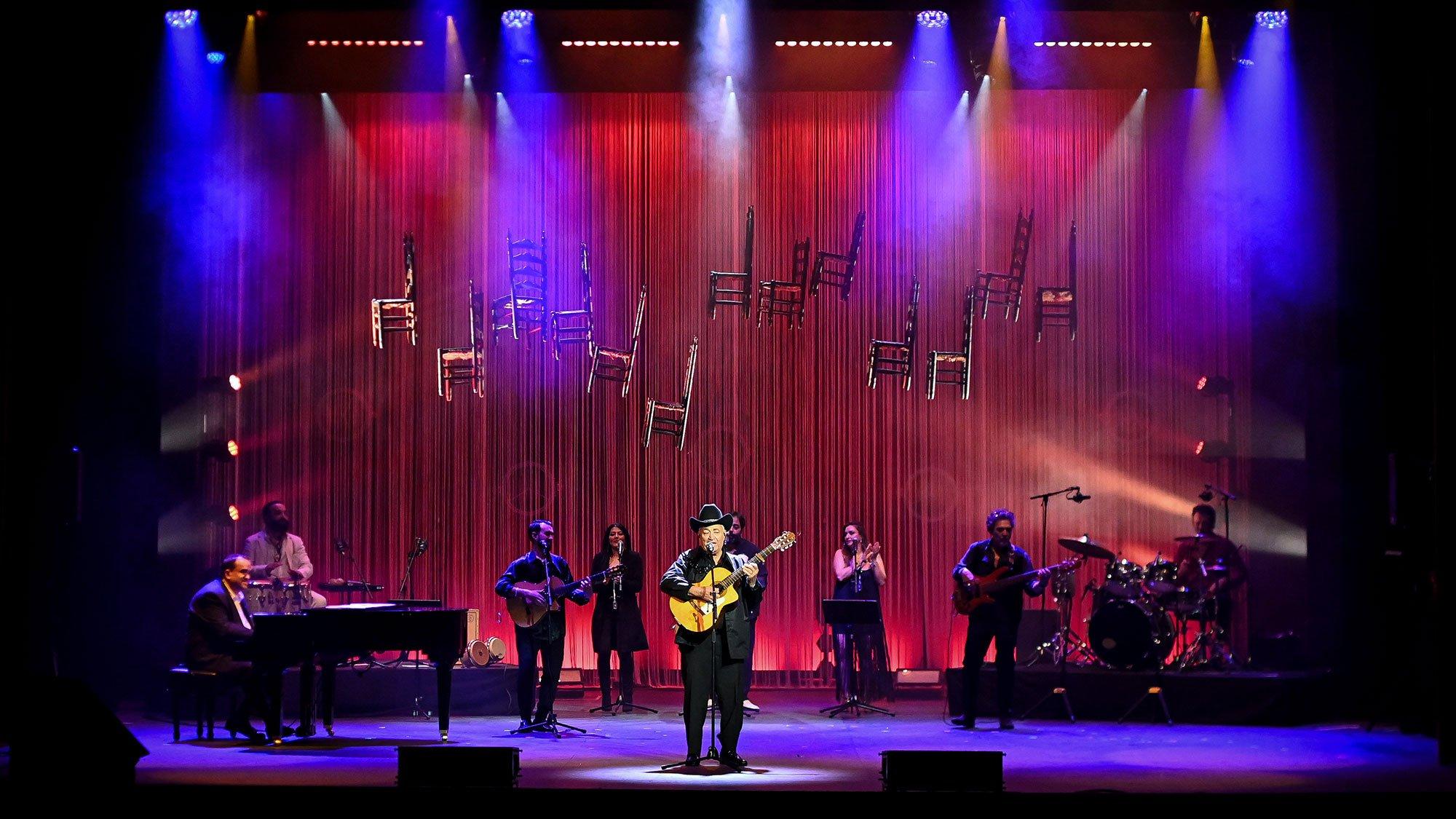
Photo: Borja B. Hojas/Getty Images for The Latin Recording Academy
news
The Latin Recording Academy Celebrates Paco De Lucía’s Legacy With Star-Studded Cádiz Event
Held in Cádiz, Latin GRAMMY Celebra: Paco de Lucía honored the legendary flamenco guitarist with a vibrant celebration featuring performances from a global roster of notable artists and musicians.
On April 15, the Latin Recording Academy held the Latin GRAMMY Celebra: Paco de Lucía event in Cádiz, honoring one of the most influential guitarists in the history of flamenco and music in general.
In keeping with the Latin Recording Academy’s mission of promoting Latin music and building bridges between countries, musical genres and cultures, the event brought together an impressive number of artists and creators, who traveled to Cádiz, Spain to celebrate flamenco master Paco de Lucía.
The celebration, attended by family members of the late Andalucian icon, witnessed unique and memorable moments beginning with the host and Latin GRAMMY nominee Miguel Poveda, who kicked off the evening with Federico García Lorca’s poem "La guitarra" before introducing de Lucía’s anthem "Entre dos aguas" alongside Juan Manuel Cañizares, José María Bandera, Rubem Dantas, Niño Josele and Abraham Laboriel.
From there, the night became a musical voyage around the world, creating opportunities for exposure to sounds beyond city and country of origin. Artists and friends of de Lucia performed some of the most beloved songs composed by the maestro, whose insatiable curiosity was a constant source of musical creation. That curiosity led him to incorporate the cajón into the flamenco genre, an event that artists Antonio Carmona, Rubem Dantes, Ané Carrasco, Tino Di Geraldo, Israel Suárez "Piraña," and Víctor Martínez chose to commemorate with a special performance during the ceremony.
The Gran Teatro Falla, where the very special musical event was held, also welcomed contributions from artists including Latin GRAMMY winners and nominees Oscar D’León, Eliades Ochoa and Berta Rojas as well as Latin GRAMMY nominees Diego Amador, María José Llergo, India Martínez, Maria Toledo y Rosario La Tremendita.
The program also featured special guests Carlos Grilo, Jesús Guerrero, Juan Habichuela (nieto), Chonchi Heredia, José Heredia "El Gato," David de Jacoba, Jaime Calabuch "Jumitus," Noemí Humanes, the Makarines, Carlos Merino and Juan Parrilla — all of whom paid homage to de Lucía’s music and mastery.
The evening’s electrifying final performance included young artists, who performed the song "Solo quiero caminar" arranged by Víctor Martínez, showcasing a striking fusion of musical genres and rhythms as they interpreted de Lucía’s musical legacy for future generations.
Also in attendance were Cádiz Mayor Bruno García and Arturo Bernal, Minister of Tourism, Culture and Sports of the Regional Government of Andalucía. Additionally, important local figures such as Esmeralda Rancapino, Claudia la Chispa, Hamza, Maria Espejo, Lucia Serrano, among others attended the celebration.
During the event an exclusive project was launched by the Latin GRAMMY Cultural Foundation in collaboration with the Paco de Lucía Foundation and Berklee College of Music: featuring the recording and video of de Lucías’s "Cositas buenas." The performance included arrangements and instrumentation by artists from the Alalá Foundation and was produced by Salomé Limón, a member of the Latin Academy’s Circle of Producers and Engineers, with the participation of four Latin GRAMMY Cultural Foundation scholarship recipients.
Proceeds from event ticket sales support the Latin GRAMMY Cultural Foundation and the Paco de Lucía Scholarship. The event was produced by Macarena Moreno and The Latin Recording Academy’s team headed by Ayleen Figueras. Carlos Narea led musical production, under the musical direction of Fernando Illán and Víctor Martínez, who also were part of the band.
The event was co-financed by the Programa FEDER Andalucía 2021-2027 and the Regional Government of Andalucía, and sponsored by the City of Cádiz and the Enrique Tomás brand of jamón ibérico.
This was the first live event that The Latin Recording Academy has hosted in the Community of Andalucía in 2024 to continue elevating its culture around the world. On May 16, they will host a new Latin GRAMMY Session at Plaza de Toros (La Malagueta) in Málaga.
Inside Green Day's Intimate "Right Here, Right Now" Global Climate Concert In San Francisco
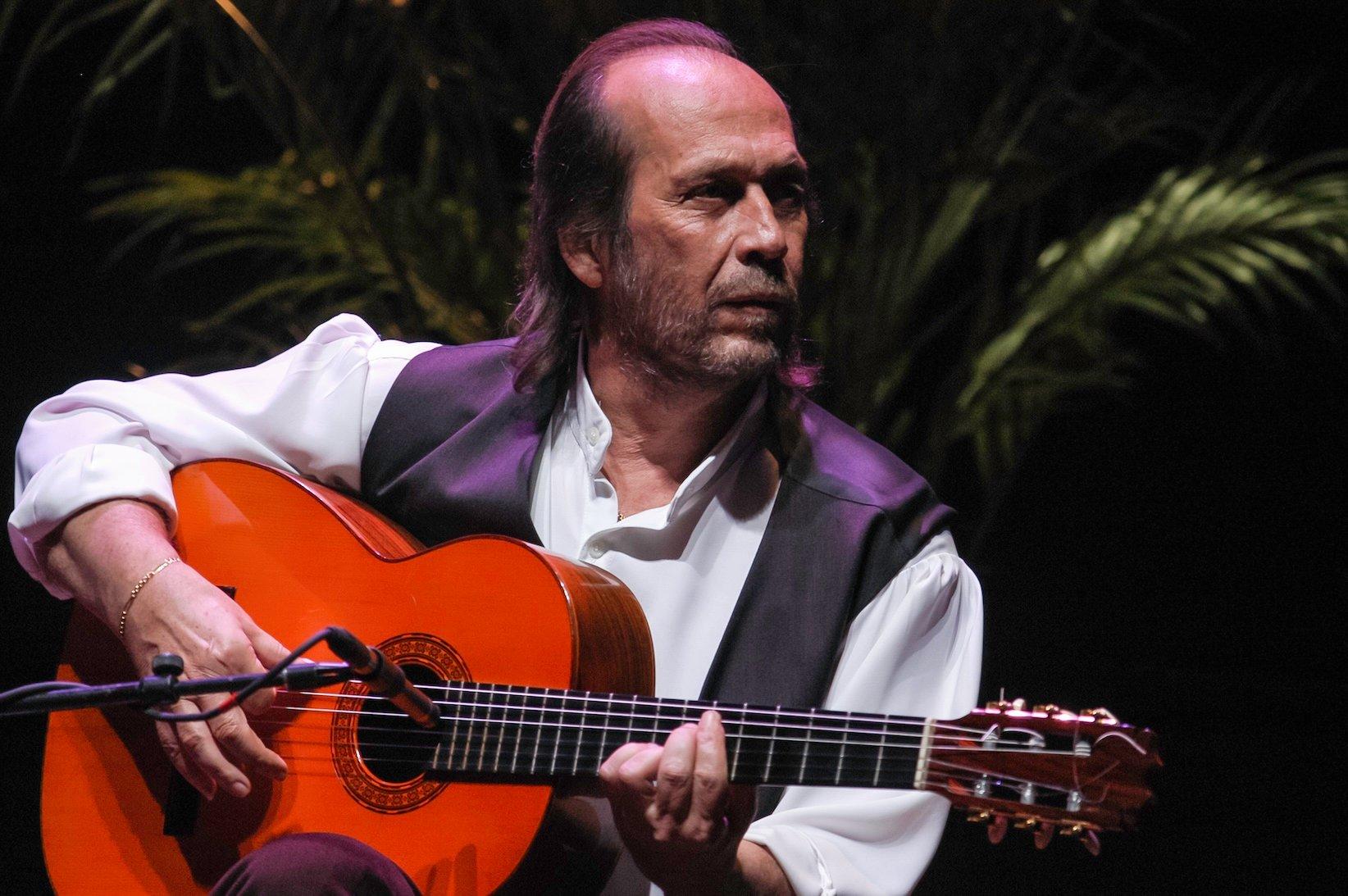
Photo: Jack Vartoogian/Getty Images
news
The Latin Recording Academy Announces Two Major Events in Spain: A Tribute To Paco de Lucía & Latin GRAMMY Session in Málaga
The Latin Recording Academy and the Regional Government of Andalucía are celebrating Latin music in Spain with two concerts. Latin GRAMMY Celebra: Paco de Lucía on April 13 in Cádiz, and a Latin GRAMMY Session with Pedro Capó in Málaga on May 16.
In a dynamic fusion of culture and music, the Latin Recording Academy has teamed up with the Regional Government of Andalucía to unveil an exciting calendar of events for 2024, all taking place in the Community of Andalucía.
The cities of Cádiz and Málaga are poised to become the epicenters of musical celebration this year, hosting two headline concerts. These events, supported by the Programa FEDER Andalucía 2021-2027 and the Regional Government, promise to offer unparalleled musical experiences, further cementing Andalucía's influence on the global cultural stage.
The festivities will kick off in Cádiz with "Latin GRAMMY Celebra: Paco de Lucía," a heartfelt tribute to the legendary artist slated for Saturday, April 13, at the Gran Teatro Falla. Paying homage to one of the most influential guitarists in the history of flamenco and music in general, the event will feature Latin GRAMMY winners Antonio Carmona, Juan Habichuela Nieto, Oscar D’León, Pepe de Lucía, Eliades Ochoa, and Berta Rojas, as well as Latin GRAMMY nominees Diego Amador, Rubem Dantas, María José Llergo, Niño Josele, India Martínez, Israel Suárez "Piraña," Maria Toledo, and Rosario La Tremendita.
Additionally, the program will feature special guests including Cañizares, Ané Carrasco, Tino di Geraldo, José Carlos Gómez, Chonchi Heredia, José Heredia "El Gato", David de Jacoba, Jaime Calabuch "Jumitus," Noemí Humanes, Juan Parrilla, José María Bandera, and 2022 Trustees Award winner Abraham Laboriel, who will pay tribute to Lucía’s music and mastery. Latin GRAMMY nominee Miguel Poveda will serve as host for the evening, and will also perform alongside Carlos Grilo, Jesús Guerrero, Makarines and Carlos Merino. The event will be produced by Macarena Moreno and The Latin Recording Academy team led by Ayleen Figueras. The musical production is spearheaded by Latin GRAMMY nominee Carlos Narea, under the musical direction of Latin GRAMMY winner Fernando Illán and Victor Martínez who will also be part of the band.
"Latin GRAMMY Celebra: Paco de Lucía" will benefit the Latin GRAMMY Cultural Foundation and the Paco de Lucía Scholarship. Tickets for “Latin GRAMMY Celebra: Paco de Lucía” are on sale now through the Gran Teatro Falla.
Málaga will follow suit on May 16 with an electrifying Latin GRAMMY Session at La Plaza de Toros, La Malagueta, featuring Latin GRAMMY winner Pedro Capó and Latin GRAMMY nominees Omar Montes and Morat. Their performances will showcase the Academy's commitment to promoting Latin music's diverse genres.
This year's events build on the momentum of previous celebrations in Andalucía, including flamenco and urban music sessions in Granada and Málaga, and the historic 24th Annual Latin GRAMMY Awards in Sevilla. The partnership between the Latin Recording Academy and the Regional Government of Andalucía continues to flourish, promising to bring even more unforgettable moments to fans of Latin music worldwide.
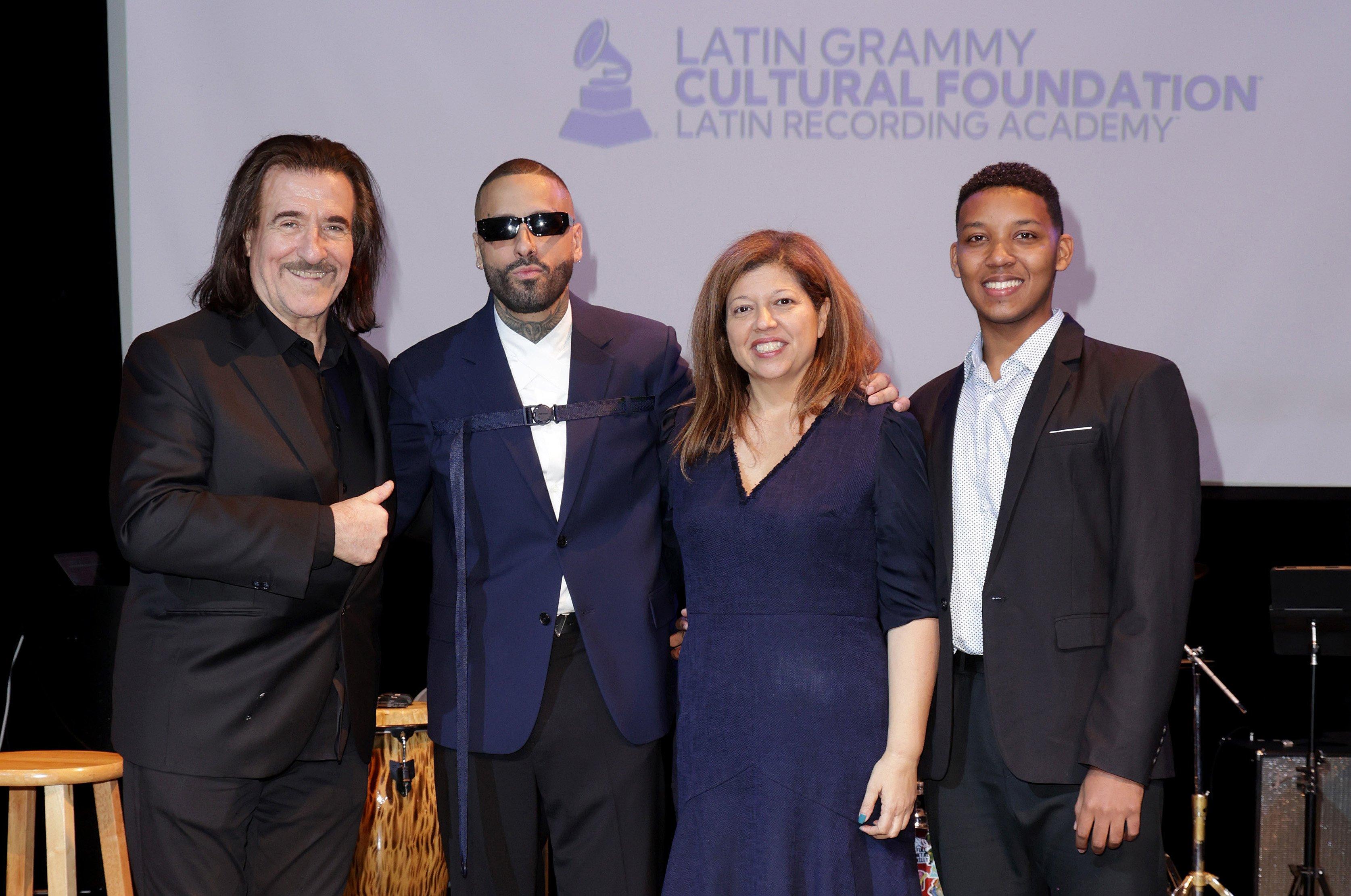
Photo: Latin GRAMMY Cultural Foundation/John Parra/Getty Images
news
Latin GRAMMY Cultural Foundation Awards Nicky Jam Scholarship To Pianist Leomar Cordero
The foundation also bestowed an additional 43 scholarships to music students the world over and announced the institution of its Scholarship Alumni Network.
The Latin Recording Academy is about much more than the Latin GRAMMYs; the organization enriches and sustains the entire Latin music community. And the Latin GRAMMY Cultural Foundation is a major component of that mission.
The Latin GRAMMY Cultural Foundation just awarded a Nicky Jam Scholarship to Dominican pianist Leomar Cordero during a special presentation with the artist in Miami. There, Jam — a Latin GRAMMY winner — performed alongside Cordero and additional scholarship recipients.
Sponsored annually by a Latin music icon, the Nicky Jam Scholarship — also known as the Prodigy Scholarship — was created nine years ago to support music education and Latin music genres. It holds a maximum value of $200,000 and allows Cordero to pursue a bachelor's degree at Berklee College of Music in Boston, starting this fall.
Previous sponsors include: Sofia Carson (2022), Juanes (2021), Julio Iglesias (2020), Emilio and Gloria Estefan (2019), Carlos Vives (2018), Miguel Bosé (2017), Juan Luis Guerra (2016) and Enrique Iglesias (2015).
Cordero, a 19-year-old musician from La Romana, was selected by the Foundation's Scholarship Committee from a highly competitive, global group of hundreds of applicants.
Since its establishment, the Latin GRAMMY Cultural Foundation has committed an extraordinary sum of more than $9.3 million in scholarships, grants, musical instruments, and educational programs throughout the United States and Ibero America.
"Since our inception nearly a decade ago, the Foundation's unwavering mission has been to support and cultivate the next generation of Latin music creators. I am humbled to announce our ninth Prodigy Scholarship winner and continue this mission," Raquel "Rocky" Egusquiza, Executive Director of the Latin GRAMMY Cultural Foundation, said in a statement.
"With the extraordinary generosity of respected artists such as Nicky Jam, we have the unique privilege of fostering the education of future generations," Egusquiza continued, "paving the way for their dreams to flourish and carry forward the rich legacy of Latin music."
"My heart swells with joy as I join the Latin GRAMMY Cultural Foundation in awarding the Nicky Jam Scholarship to the extraordinary pianist Leomar Cordero," offered Nicky Jam. "This is more than a scholarship; it's a symphony of dreams harmonizing with dedication. To witness the power of music uniting us all, to be a part of Leomar's journey, is an honor beyond words.
"Through education, we nurture the melodies of tomorrow and keep the soul of Latin music alive," Jam continued. "Congratulations, Leomar — let your music paint the world with colors only your heart can imagine."
"I am beyond thankful to the Latin GRAMMY Cultural Foundation and Nicky Jam for rewarding my efforts and motivating not just me, but also a large number of passionate young musicians who share an infinite love for music and our rich culture," said Cordero. "I am committed to making the most out of this incredible opportunity and leaving a lasting impact in the world of music."
The Foundation also announced the recipients of its annual Gifted Tuition Scholarships and Tuition Assistance Scholarships, which award 43 talented students from diverse backgrounds the opportunity to pursue an education at some of the most prestigious music institutions in the world.
In addition, upon completing their studies, Cordero and all the Gifted Tuition and Tuition Assistance scholarship recipients listed below will have the opportunity to join the newly formed Latin GRAMMY Cultural Foundation Scholarship Alumni Network.
This network formalizes the Foundation's ongoing commitment to serve beyond scholarships by providing graduates opportunities to mentor current scholarship recipients, network with industry professionals, access exclusive events and resources as well as give back to the community.
The following three students will each receive the Gifted Tuition Scholarship, with a maximum value of $100,000, which will support the tuition costs of four years of study at the university, college or music institution of their choice are:
Gabriel Américo, guitarist from Brazil
Camilo Astiazarán, guitarist from Uruguay
Olivia Soler Espinosa, tres cubano from Cuba
Tuition Assistance Scholarship Recipients:
In addition, the following 40 students will each receive the Tuition Assistance Scholarship, a one-time scholarship with a maximum value of $10,000 toward the tuition costs for the university or college of their choice:
| Name | Country | Instrument | College / University |
|---|---|---|---|
| Sofía Almeida | Portugal | Voice | Berklee College Of Music |
| Juan Diego Alván Madueño | Peru | Piano | Los Angeles College |
| Cobe Isai Banda Salcido | Mexico | Guitar | Tecnológico de Monterrey |
| Gabriel Braga | Brazil | Trombone | Faculdade de Música Souza Lima |
| Sebastián Castillo | Panama | Piano | Boston Conservatory |
| Pedro Henrique Cheik Costantin | Brazil | Guitar | Faculdade de Música Souza Lima |
| Lorenzo | Argentina | Drum Set | Berklee College of Music |
| Abner Felipe Dos Santos Martins | Brazil | Electric Guitar | Faculdade de Música Souza Lima |
| Juan Pablo Faundez | Chile | Drum set | Berklee College of Music |
| Marien Femerling García | Mexico | Piano | Manhattan School of Music |
| Rodrigo García Vargas | Mexico | Piano | Manhattan School of Music |
| Yandy García-Palacio | Cuba | Drums | Berklee College of Music |
| Francisco Garrido | Venezuela | Guitar | Conservatorium van Amsterdam, Netherlands |
| Luis González | Venezuela | Cello | Chicago College of Performing Arts |
| Andres Guerra | Venezuela | Guitar | Mannes School of Music at The New School |
| Sebastián Guerrero | Colombia | Electric Bass | Longy School of Music |
| María Insuasti | Colombia | Voice | Concordia University Irvine |
| Julieta Iricibar | Argentina | Voice | The New School |
| Pau Jorba Bonastre | Spain | Saxophone | The New School |
| Marina Marchi Silveira | Brazil | Voice | Faculdade de Música Souza Lima |
| Simon Martínez | Ecuador | Piano | Berklee College of Music |
| Laia Martínez Gelabert | Spain | Electric Bass | Berklee College of Music |
| John Maruri | United States | Drums | Jacobs School of Music, Indiana University Bloomington |
| María Medina Almaguer | Cuba | Piano | Berklee College of Music |
| Pedro Mujica | Venezuela | Flute | Jacobs School of Music, Indiana University Bloomington |
| Rafael Ernesto | Cuba | Piano | Berklee College of Music |
| Daniel Olivero | Venezuela | Voice | Berklee College of Music |
| Estevan Olmos | United States | Percussion | University of Southern California |
| Andrés Felipe Palacios Rodas | Colombia | Guitar | Peabody Institute of the Johns Hopkins University |
| Andy Popescu | Australia | Electric Bass | Berklee College of Music |
| Murilo Reis Teixeira | Brazil | Piano | Faculdade de Música Souza Lima |
| Kalebe Requena | Brazil | Trumpet | Faculdade de Música Souza Lima |
| Oscar Rojas | Mexico | Piano | Berklee College of Music |
| Juan Sebastián Sánchez | Colombia | Percussion | Berklee College of Music |
| Arthur Scarpini | Brazil | Guitar | Faculdade de Música Souza Lima |
| Kristalis Sotomayor Matos | Puerto Rico | Flute | Boston Conservatory |
| Cristian Tamblay | Chile | Drum Set | NYU Steinhardt |
| Gustavo Tenes de Oliveira | Brazil | Bass | Faculdade de Música Souza Lima |
| Guillermo Wan | Ecuador | Electric Bass | Berklee College of Music |
| Tianxiang Ni | China | Piano | Bard College |
Congratulations to all involved, and keep watching this space for more news and information about the Latin Recording Academy!
Latin GRAMMY In The Schools & El Fantasma Team Up To Support Music Education In San Antonio
